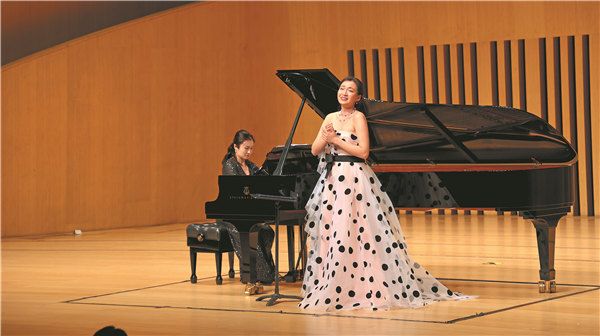

Young pianist's recitals highlight unique friendship between the composers Johannes Brahms and Robert and Clara Schumann, Chen Nan reports.
What do you expect to hear from a young musician's recital? For Chinese-American pianist and soprano Chelsea Guo, whose Chinese name is Guo Ziyao, she offered audiences something rare.
During her first tour in China, which ran from Dec 22 to 31 and visited cities, such as Chengdu in Sichuan province, Wuhan in Hubei province, and Changsha in Hunan province, the 22-year-old musician presented programs centering on the relationship between Johannes Brahms, Robert and Clara Schumann.
The Schumann couple were famous musicians during the Romantic period of classical music. In 1853, when Robert Schumann met the promising young composer, Brahms, it marked the establishment of a famous love triangle in classical music history.
Guo explored this story through music, performing the many compositions they dedicated to one other in her recitals.
"The program I put together is truly about the human experience. I have always felt a strong connection to the relationship between Johannes Brahms, Robert Schumann and Clara Schumann. Somehow, the love, friendship, and loyalty among these three artists tells an honest story of being human," said Guo, following her recital in Beijing, which was staged on Dec 28. "Many know the famous story of Brahms' unrequited romantic love for Clara, and while the music very possibly reflects that, this set of pieces is really focused on the trio's friendship, specifically how Brahms supported the Schumanns during Robert's mental decline."
The recital's first half was all piano. According to Guo, Brahms' Variations on an Original Theme, Op 21 No 1 in D Major is one of the most warm and affectionate pieces of music, which is evidence of his deep care for the Schumanns, written shortly after the death of Robert.
The piece that followed, Clara Schumann's Three Romances, Op 21, is thought to have been dedicated to Brahms as an expression of her gratitude for his unwavering presence during Robert Schumann's time in psychiatric care, during which the young composer helped look after her and the Schumanns' many children.
Guo wrapped up the first half of her recital by playing Rachmaninoff's selection from Morceaux de Fantaisie Op 3 (a collection of five piano solo pieces), and though this composer may seem irrelevant to the theme of the recital, the piece offers a different musical perspective of very similar experiences: grief, love, and a clown that cunningly mocks the tragedy of life.
The second half was all vocal. After the intermission, Guo took the audience into a world of love songs by Rachmaninoff, followed by Brahms' art songs, and the audience were taken back to the main story.
Robert Schumann's art song cycle, Frauenliebe und Leben (Woman's Love and Life), Op 42, brought the recital to an end. For female voice and piano, the song cycle was inspired by eight poems by a friend and deals with the trauma of a woman, from losing the man who was her first love to the eventual death of her husband.
The recital closed with Robert Schumann's Widmung (Dedication), which was written for Clara as a wedding gift.
"Life is often tragic, but beauty, friendship and love are what bring us through," notes Guo.
Despite her young age, Guo has stood out as both a classical pianist and a soprano. As she sees it, being a pianist allows her to express herself in a much quieter way while singing is very different, "which is about being extroverted".
"They represent different sides of me, both my ways of expression," says Guo, who won at the Young Concert Artists International Auditions in 2022 as both pianist and vocalist. The double award was a first in the history of the nonprofit organization, which was founded by Susan Wadsworth in 1961 and has been dedicated to discovering and launching the careers of exceptional, but lesser known, young musicians from all over the world.
Born to Chinese parents in New York, Guo learned to play the piano at about 4 years old. Her mother, He Jing, an art enthusiast who learned to play the violin and danced as a child, supported Guo's decision to become a musician.
"We told her lots of stories when she practiced the instrument, hoping for her to be creative and express the music with imagination," He explains.